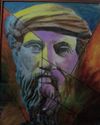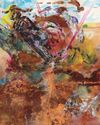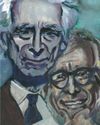
"Bernard Williams once posed the awkward question, What is the point of doing philosophy if you're not extraordinarily good at it? The problem is that you can't, by sheer hard work, like a historian of modest gifts, make solid discoveries that others can then rely on in building up larger results. If you're not extraordinary, much of what you do in philosophy will... [probably] be both unoriginal and wrong. That is why most of the philosophy of the past is not worth studying. So isn't there something absurd about paying thousands of people to think about these fundamental questions?"
(Thomas Nagel, Other Minds, 1995, p.10.)
When Thomas Nagel wrote this passage, he was mainly questioning the point of philosophy understood as a profession, but as a professional philosopher, I can't help but take Williams' challenge personally. If what we write is overwhelmingly likely to be rightly forgotten, what's the point of writing it?
There are some obvious answers. Publication is a condition of tenure. If you're a reasonably good philosopher, your writing will win you professional recognition. You'll be invited to conferences where you'll enjoy professional camaraderie and beers with your friends. You may get competing offers that will allow you to jack up your salary. Your students will be impressed by your accomplishments, perhaps more than they should be. But each of these rewards is extrinsic, so none gives us any more reason to spend our lives writing philosophy than it would to spend them juggling flaming torches or winning pie-eating contests if those activities were equally rewarding. Is this really all that can be said?
この記事は Philosophy Now の October/November 2023 版に掲載されています。
7 日間の Magzter GOLD 無料トライアルを開始して、何千もの厳選されたプレミアム ストーリー、9,000 以上の雑誌や新聞にアクセスしてください。
すでに購読者です ? サインイン
この記事は Philosophy Now の October/November 2023 版に掲載されています。
7 日間の Magzter GOLD 無料トライアルを開始して、何千もの厳選されたプレミアム ストーリー、9,000 以上の雑誌や新聞にアクセスしてください。
すでに購読者です? サインイン

FALLING DOWN
Thomas R. Morgan considers how personal identity is maintained, and how it is lost.

Pythagoras (570-495 BCE)
Daniel Toré looks beyond the mathematician to the philosopher.

Wordsworth & Darwin
Christine Avery wonders whether poetry can help us to deal with science.

Plants & Philosophy
Caroline Deforche sees similarities between gardening and philosophising.

Dr.Gindi sculptor, has a philosophical conversation with Richard Baron about sensation, life, infinity and, you guessed it, sculpture.
Dr. Gindi is one of Switzerland's foremost sculptors, whose work has been exhibited in many countries.

Thomas Aquinas on Extraterrestrial Life
Babatunde Onabajo tells us why Aquinas did not believe in aliens.

The Fire This Time
Tim Madigan on Ray Bradbury, Bertrand Russell and Fahrenheit 451.

Trust, Truth & Political Conversations
Adrian Brockless wants a recognition of human value in political debate.

Philosophy & The Crown
Vincent Di Norcia on monarchy and stability.

Technologists & Ethicists
Stephen L. Anderson laments inadequate moral insight among tech leaders.